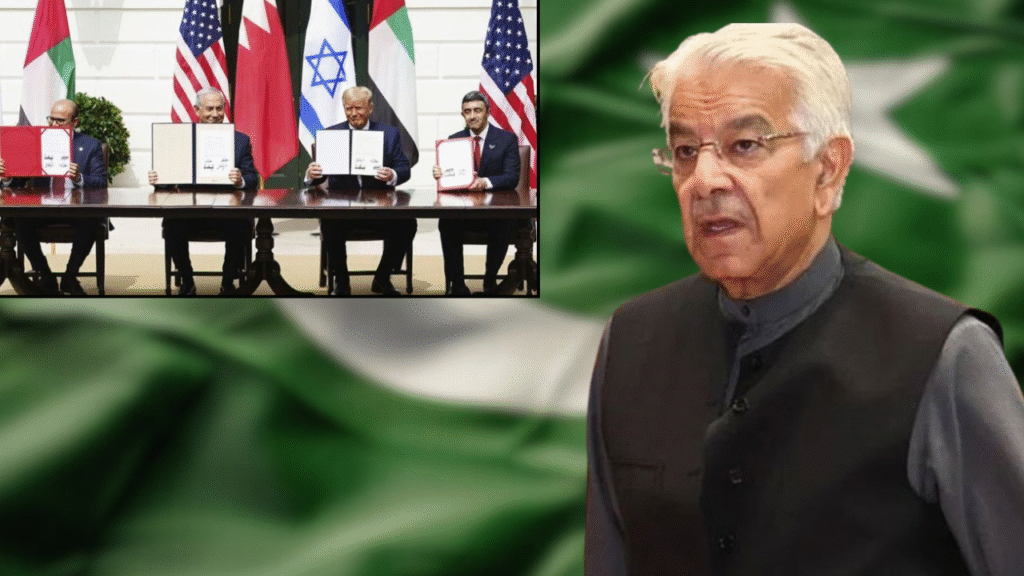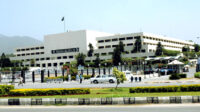This article is written by Major (r) Haroon Rasheed. The writer is a Defense & Strategic Affairs Analyst.
Introduction: A Controversial Crossroads
Recently, unconfirmed reports have emerged suggesting that the United States is quietly pressuring Pakistan to consider signing the Abraham Accords—a historic normalization agreement between several Muslim countries and Israel. Renowned Pakistani journalist Hamid Mir has also hinted that such pressure isn’t new and that similar attempts were made during the first term of Donald Trump administration.
With Pakistan facing an unprecedented economic crisis, growing IMF dependency, and a reshaped Middle Eastern geopolitical landscape, the question arises: Is Pakistan preparing to normalize ties with Israel under external pressure? And if it does, what could be the consequences—political, social, and religious?
BCCI Set To Call Off Bangladesh Tour Due To Political Tensions
PM calls for regional unity, condemns Israeli, Indian aggression against Iran, Pakistan
President, PM vow to eradicate terrorism from country
For more such Opinions & Blogs, click here.
What Are the Abraham Accords?
The Abraham Accords were first signed in 2020, initiated by the Trump administration, as a landmark peace agreement to normalize relations between Israel and countries like the United Arab Emirates (UAE), Bahrain, Sudan, and Morocco. The agreement was marketed as a means to:
- Promote peace and economic cooperation in the Middle East.
- Counter the growing influence of Iran.
- Sideline the traditional Palestinian issue by focusing on state-to-state benefits.
- Strengthen strategic ties with the United States.
In return, these countries have received defense deals, economic investments, and diplomatic favors from Washington.
Security forces kill 30 Khawarij in North Waziristan
Spillways of Tarbela dam open to release water
Is Pakistan Being Pressured to Join?
While Pakistan has not officially commented on these recent rumors, there is growing speculation in diplomatic and media circles that the United States, backed by Gulf allies, is actively encouraging Pakistan to join the normalization framework.
Pakistan has traditionally supported Palestinian statehood, and its constitutionally embedded ideological stance makes formal recognition of Israel a sensitive and controversial issue.
However, the economic situation in Pakistan is dire:
- Skyrocketing inflation and a weak rupee
- Over $130 billion in external debt
- Repeated IMF bailouts
- Desperate need for foreign direct investment and regional trade routes
These factors could push policymakers toward pragmatic decisions that may override ideological narratives.
Pakistan win Asian Youth Girls Netball Championship
Death anniversary of renowned folk singer Allan Faqir being observed today
Would Pakistan Sign the Abraham Accords?
At this stage, no official roadmap toward normalization with Israel has been declared. However, some indicators point toward a potential shift in the future:
1. Silent diplomacy: Backchannel communications between Pakistani and Israeli representatives have occurred in the past, including reports of secret meetings in third countries.
2. Changing Gulf dynamics: Traditional allies like UAE and Saudi Arabia are no longer bound by the Palestine-first approach.
3. Geostrategic repositioning: The U.S. withdrawal from Afghanistan and cooling relations with China may prompt Pakistan to rebuild relations with Washington.
4. Economic pragmatism: Recognition could open doors to Israeli technology, agriculture cooperation, and access to Western capital markets.
However, such a decision will not be taken lightly and would almost certainly involve military, intelligence, and religious consensus behind closed doors.
Had 30-45 Seconds To React: Rana Sana Ullah On India’s BrahMos Attack
What Will Be the Public Reaction?
If Pakistan were to formally sign the Abraham Accords or recognize Israel, the public and political backlash would be immediate and intense:
Religious parties (Jamaat-e-Islami, JUI-F, TLP) will oppose normalization fiercely and may launch nationwide protests.
Mainstream opposition would likely exploit the decision to gain political mileage by accusing the government of betraying the Kashmir and Palestine causes.
Civil society, youth activists, and a large section of the urban middle class—already skeptical of government policies—may perceive this as a “sellout for dollars.”
Extremist elements could use the decision as propaganda to radicalize and mobilize followers.
On the other hand, a section of the population—especially business leaders, academics, and diaspora communities—might see it as a realistic step toward progress and economic stability.
In short, the reaction would likely be polarizing and politically explosive.
CJCSC, South African Air Chief discuss military ties
PM in Azerbaijan to represent Pakistan at 17th SCO Summit
Implications for Pakistan’s Foreign Policy
If Pakistan signs the Abraham Accords, it would fundamentally change:
- Its position in the Muslim world, especially within the Organisation of Islamic Cooperation (OIC)
- Its diplomatic relations with Iran and Turkey, both of which oppose normalization with Israel
- Its traditional narrative of supporting oppressed Muslim nations (Kashmir and Palestine)
- Its strategic alignment, potentially improving ties with the West and Gulf Arab states
But it would also raise questions about Pakistan’s ideological identity, which has historically been rooted in Islamic unity and anti-colonial solidarity.
India To Allow Pakistan Hockey Team To Compete In Asia Cup
Israel Signs $510 Million Deal With US To Turn Old Bombs Into GPS-Guided Smart Weapons
Conclusion Between Principle and Survival
Pakistan today stands at a delicate crossroads. On one side lies economic necessity, international pressure, and the lure of geopolitical benefits. On the other stands deep-rooted ideological identity, religious solidarity, and public emotion.
The debate around the Abraham Accords is not just about Israel—it’s about what kind of country Pakistan wants to be in the 21st century: a state driven by principle, or one shaped by survival.
Whatever decision is taken, it must be done transparently, with consensus, and by weighing long-term national interest over short-term gains.
For more such Opinions & Blogs, click here.
No Clear Association: Indian Doctors Dismisses Link Between Covid Vaccines, Heart Attack Deaths
UK’s Stranded F-35B Jet In KeralaTo Be Dismantled, British Navy To Send Bigger Aircraft For Airlift
International climbers achieve first summits of Pakistan season on Nanga Parbat
PM Shehbaz leaves for Azerbaijan to attend ECO summit
This article is written by Major (r) Haroon Rasheed. The writer is a Defense & Strategic Affairs Analyst.
Stay tuned to Baaghi TV for more. Download our app for the latest news, updates & interesting content!






